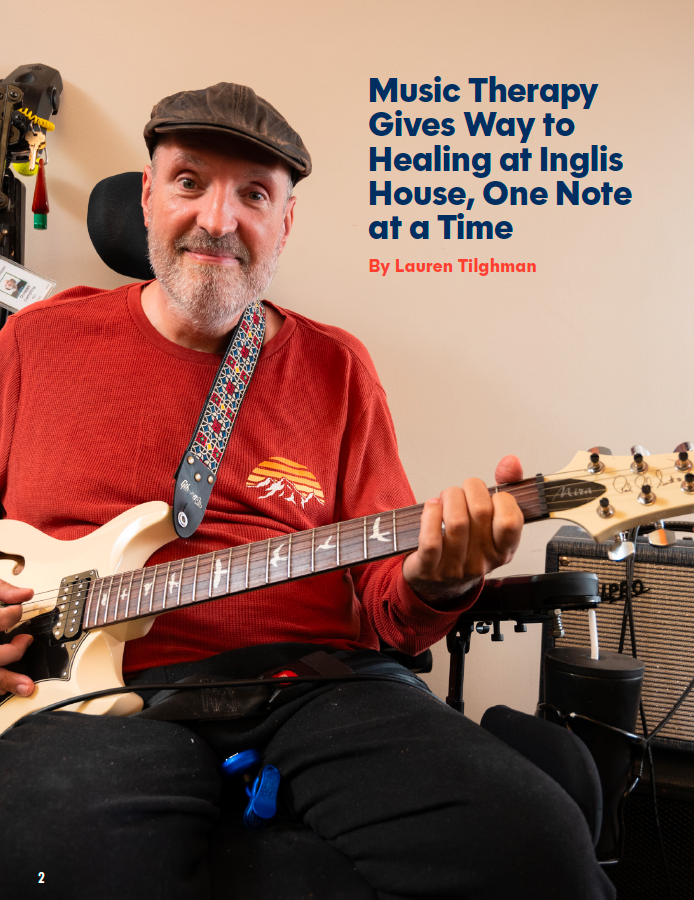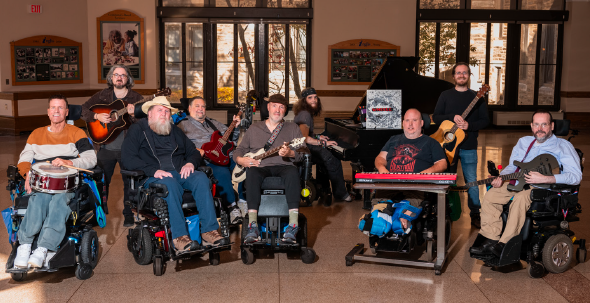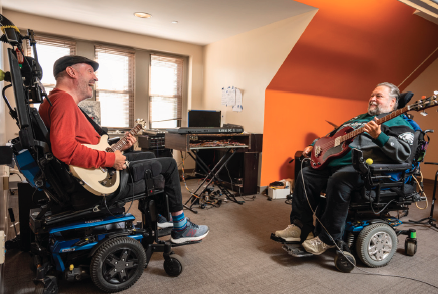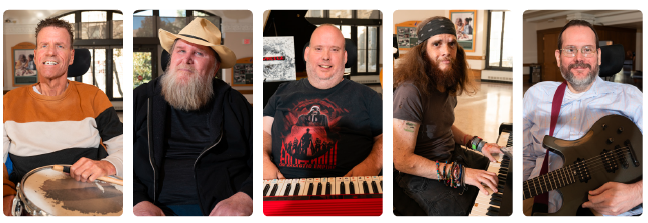January 31, 2025
Music Therapy Gives Way to Healing at Inglis House, One Note at a Time
 By Lauren Tilghman
By Lauren Tilghman
Music has a way of complementing every facet of our existence; when we’re in celebration—we dance to it, when we’re in mourning—we grieve with it. Music provides the “soundtrack” to our lives in good times and in bad times. It’s our release, it’s our form of expression, and it’s healing. That’s why music therapy plays such a pivotal role in the program offerings at Inglis House.
There are roughly 6-8 music-based group activities running in any given season at the House—including bell choir, vocal ensemble, music theory, songwriting group, and even an in-house rock band. Professional musicians often come to perform concerts; people participate in weekly jam sessions with percussion instruments; and music bingo is a fan-favorite activity, especially on the weekends. 65% of Inglis House residents have participated in at least one music therapy activity, and 50% of residents participate in the music therapy program offerings on a regular basis.
It has brought peace and comfort to those in hospice, and for many Inglis House residents it has had a positive and empowering impact on how they navigate their diagnoses or different injuries that they have sustained. In 2018 Duncan Campling experienced two strokes that left him with Locked-in syndrome; a complex medical condition that results in complete paralysis of all voluntary muscles except for one’s vertical eye mobility (up and down movements). Over time, and with regular rigorous therapy, many people with Locked-in syndrome can regain some, but rarely, all of their mobility.
A family man and father of two young boys, he was the youngest resident at two of the nursing home facilities he resided in before coming to Inglis House in late 2023. It wasn’t long after his arrival that Duncan learned about the Wheelz band. An avid guitar player himself, he “auditioned” for the Band after listening in on one of their jam sessions. “I’ve been involved with playing music since I was about 15, and started playing the guitar,” shared Campling. “Since my stroke, my hands work, but they’re a lot slower.”
But his strumming speed hasn’t deterred him from his regular post in the Resident’s Lounge, better known as the ‘Wheelz Studio,’ nor from practicing songs alongside Dave Zawacki.
Both bandmates meet up in the Studio during off-hours to play together, as well as during the scheduled weekly practices on Wednesday afternoons. Dave, a bassist in the Band, received a laminectomy that led to a medical emergency and left him partially paralyzed. A fellow music hobbyist, Dave had played music and sang most of his life. “I really, really enjoyed playing the tenor sax, so I played that for years, [also] clarinet and a bass clarinet, and of course guitar; you know, just a plain old six string,” shared Zawacki.

After his medical emergency Dave lost the use of one of his hands which made it difficult to play many of the instruments he loved. Prior to coming to Inglis House he was residing at a different facility; it was his sister and cousin who learned about Inglis and its robust music therapy program. Little did Dave know that the music therapy program and meeting the Wheelz band leaders—Stephen (Steve) Cozzolino, one of the Music Therapists and Dan McGowan, a Music Teacher and bassist for the band internationally recognized Kansas—would lead him back to one of his greatest passions.
“I was a little angry that I got moved; I was just like ‘oh I was doing fine at the last place,’ and then I got moved here,” shared Zawacki. “And then I met Steve and Dan, and Dan would come by and play songs. Steve, every day would come by and say, ‘hey we’re doing this and we’re doing that’… you know pushing somebody; so that got me slowly involved in it.”
It was the push Dave needed.
“That gave me something to do, something to look forward to, you know, going over to work on a song,” shared Zawacki. “I’d try to remember a song, and you know, show it to the guys.”
This past June, both Duncan and Dave performed in their first Musicfest, Inglis House’s signature summer community concert, alongside six other bandmates (Steve and Dan included). “It was great; this was my first one that I played, but I was here [last year] and got to see the Musicfest,” said Zawacki. “It was great playing because you get to play in front of people, ya know…and it’s cool to play in front of people.”

For both gentlemen, alongside many other Inglis House residents, the music therapy program helped them reconnect with a special part of their lives. “It really speaks to how deeply rooted music is here at Inglis House, because a lot of folks had either previous relationships to music that they have revived being here— like the rock band folks, [and] there’s a good chunk of people who really haven’t had that much of a relationship with music that has since blossomed into something really beautiful,” shared Mer Clemente, one of the Music Therapists in Inglis House.
"It really speaks to how deeply rooted music is here at Inglis House ”
It also has a significant, positive impact on the mental health of a community of people who often experience feelings of isolation, depression, and anxiety more frequently. According to the Center for Disease Control (CDC) adults with disabilities report experiencing more mental distress than those without disabilities. An estimated 17.4 million (32.9%) adults with disabilities experienced frequent mental distress, defined as 14 or more reported mentally unhealthy days in the past 30 days. Music therapy, according to Psychiatry.org, is a proven tool for providing a safe and “supportive environment for healing trauma and building resilience while decreasing anxiety levels.”
Duncan Campling, who also writes his own music, has seen a change in himself since arriving at Inglis House and participating in different music therapy programs. “I stopped taking my anti-depressants when I got to Inglis House,” shared Campling.
“You’ll hear stories about folks who came from prior facilities that didn’t really have a lot of—not just music therapy—but a lot activity therapy; and they go from like ‘oh yeah, I was just in a room,’ to [being engaged] all day, every day,” shared Cozzolino. “You have residents who you can’t find because they’re so busy, they’re so involved, you know?”
For Dave, that involvement has blossomed into a desire to help others as well. As Wheelz continues to improve its sound, he hopes the Band and its music can have a positive impact on other people outside the Inglis House community—including veterans. In the meantime, he’ll keep allowing the music to be his own healing “soundtrack” in life, both inside and out.

Additional members of Wheelz band (left to right): Keith Crass, Kevin Ryan, Craig Stevens, Chris Hinchey, Patrick Hatfield
